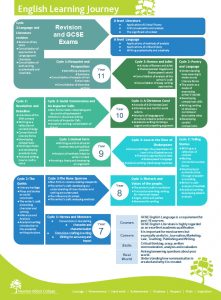Curriculum Intent
At Newton Abbot College, our English Curriculum is designed to allow students to experience Literature as a mode of communication that simultaneously reflects the society it is a product of, reflects an individual’s experiences and is the product of a reader’s own personal response. Our students are taught to recognise that English Language and Literature is about finding a voice, and our curriculum strives to represent both those traditional voices, alongside the voices of those who have not always been heard. We believe that students are entitled to powerful knowledge, and consequently our curriculum engages students with famous canonical works, which we invite students to study with a critical eye, alongside more contemporary and diverse texts. Students are exposed to a wide range of Literary conventions and forms, and given the disciplinary language needed to identify, discuss and analyse these forms.



